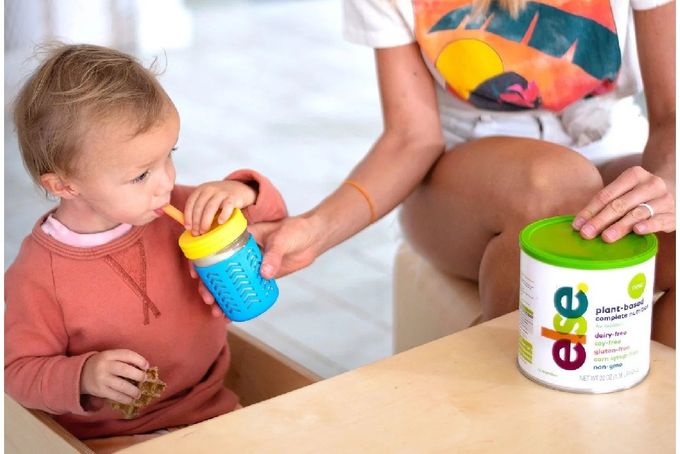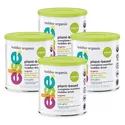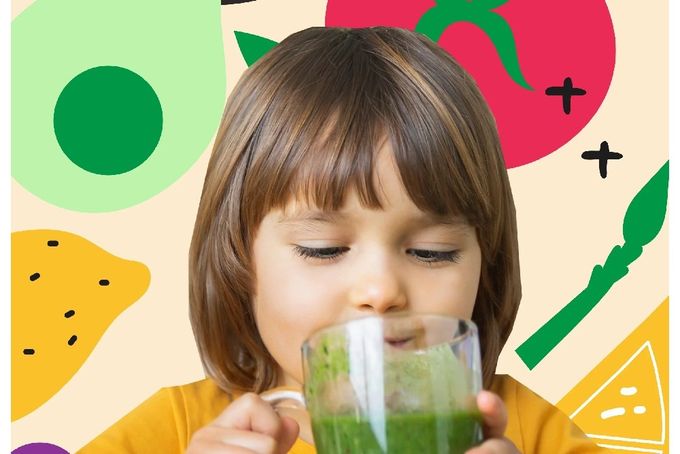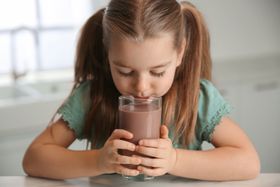Toddler Nutrition Drinks: Factors to Consider
Considering toddler nutrition drinks? Here's what to keep in mind, from ingredients to nutritional value, ensuring you make the right choice for your little one's health.
Updated April 26, 2024

While the overwhelming majority of parenthood is unpredictable, it’s a given that your children are going to go through periods of selective eating from time to time. One of the most common home remedies for picky eating or kids experiencing a poor appetite is to offer them a nutritional drink. But is this approach good for kids? When should you use nutritional drinks for toddlers, and how to choose one with the most benefit?
What are Nutritional Drinks?
Liquid nutritional supplements are commercial beverages that have been intentionally formulated to pack nutrients and calories into a relatively small serving size.
They often come in an array of flavors, like chocolate, vanilla, and peanut butter, and are intended to both taste good to your child and be convenient for your family’s lifestyle.
But when should you use nutritional drinks for your child? The answer is that it depends.
When to Use Nutritional Drinks for Kids
These types of products are generally designed to promote health and weight gain among kids who may be at a higher risk for malnutrition. They can also help make sure growing children are getting enough important vitamins and minerals that may otherwise be lacking in their diet.
Every parent and caregiver is familiar with phases of selective eating, or variance in appetite among kids, and nutritional drinks often serve as a comfort to help make sure kids are still getting enough nutrition.
Today you can find plenty of nutritional drinks made just for kids. However, not all of them are created equally which makes it important to know what you’re looking for and what’s most important to you.
What to Look for in a Nutritional Supplement
When you’re considering adding a nutritional supplement to your toddler’s routine, there are several things that you may want to keep in mind. Below are some of the main comparison points among nutritional supplements for kids.
» Discover quick and nutritious meals for your toddler
Ingredients
One of the first things you may notice about any nutritional supplement for kids is the sheer number of ingredients that may be listed in the formulation.
While this may be overwhelming or off-putting, remember that a major purpose of these products is to either help promote weight gain or otherwise provide a concentrated source of nutrients in a small serving. As such, it’s not uncommon for there to be a lot of ingredients.
What may be more important to you when looking at the ingredient list is how many of them appear to be ultra-processed rather than derived from whole foods sources. Are you able to decipher what most of the ingredients on the label are, or do you see a long list of foreign substances?
Keep in mind that there will be some degree of more processed ingredients in nearly every formula you come across. What’s most relevant is for you to decide just how many are okay for your needs.
Purpose
Remember that different nutritional supplements may be intended for different purposes. Choose one that makes the most sense for your child’s needs.
Some of them are designed specifically to help kids gain weight, or prevent weight loss among very active children. For example, some are made to contain a large number of calories per serving that can be especially beneficial for kids who are at risk for malnutrition.
Others are intended simply to provide more protein, formulated with fewer calories, but more protein and an array of vitamins and minerals to help bridge nutritional gaps in their diet as more of a nutrition sidekick.
What is the main reason you’re interested in adding a nutritional supplement to your child’s diet? If it’s for weight gain, looking or one that’s calorie-dense may be best. If you’re primarily looking to help fill gaps during periods of selective eating, perhaps you don’t need a high-calorie option but one that’s full of vitamins, minerals, and contains some protein instead.
Plant-Based vs. Animal-Derived
Many nutritional supplements are dairy-based, but there are a growing number of products for kids that are plant-based instead. For example, drinks made using a soy base are also popular.
Else products are made without soy or dairy. Instead, Else toddler nutritional drinks are made using a plant-based combination of buckwheat, almond and tapioca. This allows for a nice option for parents of children who are both daily- and soy-free.
The best choice for you depends on your family’s personal preferences and of course whether your child requires specific dietary restrictions.
» Discover alternatives to Enfagrow toddler formula
Added Sugar Content
Overall, the less added sugar in a nutritional supplement the better. This is because a high intake of added sugar is associated with both an increased risk for unwanted weight gain or obesity and related chronic diseases, as well as dental cavities.
Furthermore, it’s not surprising that many nutritional drinks - and other products designed for kids - are packed with sugar simply to make them taste better, even to make them more addicting. While the idea of our children wanting to eat during periods of picky eating is attractive, remember that a child who consumes a diet higher in sugar is more likely to develop a palate for sugary foods.
It’s nearly impossible to totally avoid added sugar in today’s food environment, especially when it comes to kid foods. However, being conscious of where added sugar is coming from and keeping it at a minimum is a good preventive practice.
On a nutritional supplement label, look for ingredients like cane sugar, high fructose corn syrup, corn syrup, cane syrup, brown rice syrup, and glucose, which are all names for added sugar. Choose products with these at the end of the ingredient list, indicating that they’re present in the smallest amounts, or products that are free from added sweeteners.
Purity
When examining the packaging of a nutritional drink for toddlers, pay attention to whether it contains reputable certifications for purity.
This means that the product has been tested and verified to be free from potentially harmful levels of contaminants. This includes things like heavy metals and pesticides. Many of these contaminants exist in nature and can therefore end up in products like nutritional supplements, but manufacturers can invest in clean ingredient sourcing and testing to make sure minimal amounts are not posing health risks for the consumers.
One example of a purity certification is The Clean Label Purity Award. This award examines products for compounds that wouldn’t be listed on the label, such as chemicals of concern, environmental toxins, and invisible contaminants that may pose negative risks.
It takes into consideration the entire ingredient supply chain and elevates the importance of adequate quality assurance systems. After all, while nobody wants to be consuming potentially harmful contaminants, we certainly don’t want to be feeding our children these things.
Else Nutrition Toddlers and Kids supplements are Clean Label Purity Award certified.
Potential Downsides
While nutritional supplements can certainly offer benefits, there may also be some downsides to consider before adding them to your child’s diet.
Some nutritional drinks may also lead to digestive upset for some kids. The nutritional makeup of these supplements, like fiber and sugar, might trigger things like bloating and abdominal cramping, constipation, and nausea.
Lastly, high-calorie nutritional supplements can be a great option for adding energy and nutrients to your child’s diet in a small serving. However, they can also take up space in little tummies and prevent the consumption of other healthy foods and drinks.
If your child uses a nutritional drink and you notice that their intake of other foods is declining, it may be best to reduce their use.
Examples of Leading Nutritional Supplements for Kids
So, how do current leaders in the nutritional supplement industry stack up? Here’s a look at some popular brands for kids and what they have to offer.
- Orgain: Orgain kids’ drinks come in both plant-based and dairy-based whey protein formulas. Their plant-based drink uses pea protein and chia seeds. It offers 8 grams of protein, 8 grams of fat, 3 grams of fiber, and 9 grams of added sugar per serving. This product is certified organic and non-GMO.
- Pediasure: Pediasure offers Grow & Gain products to promote healthy weight gain and growth, and Sidekick products to help bridge nutrient gaps in a child’s diet. One serving of Grow & Gain provides at least 7 grams of protein, 9 grams of fat, 1-3 grams of fiber, and 9 grams of added sugar. The Sidekick products contain 10 grams of protein, 6 grams of fat, 3 grams of fiber, and 16 grams of added sugar per serving. Some of their products also have a USDA organic certification.
- Kate Farms: This is a line of plant-based nutritional drinks for kids that use USDA Organic pea protein and are free from gluten, soy, dairy, and artificial sweeteners. Their pediatric line is designed for children ages 1-13 years old, intended to provide adequate nutrition and aid in weight gain where needed. One serving provides 12 grams of protein, 12 grams of fat, 3 grams of fiber, and 9 grams of sugar.
- Else Nutrition: Else Kids drinks are plant-based and made with whole foods buckwheat, almond, and tapioca. One serving provides 5 grams of protein, 8 grams of fat,1 gram of fiber, and 4 grams of added sugar, the lowest added sugars option. Else products bear the Clean Label Project award and are also USDA Organic, non-GMO, and free from dairy, soy, gluten, and corn syrup.
Homemade Nutritional Drink Alternatives
If you’re looking for an alternative to a commercial nutritional supplement, you could try making a nutrient- and energy-dense version at home. Based on your child’s needs and preferences, you can tailor the recipe’s ingredients and flavors.
Some calorie-dense ingredients that work well for homemade shakes include peanut, cashew, or almond butter as well as full-fat soy, pea, or oat milk. Use pitted dates for a natural sweetening agent. Incorporate chia, hemp, or flax seeds for additional calories, fiber, and other healthy nutrients.
A variety of fruit, like apples, pineapple, berries, mango, peaches, and bananas blend well together, and smoothies are a great place to blend in leafy greens like spinach and kale. For even more calories and protein, add a scoop of plant-based protein powder or some Else formula.
» Read more about how to incorporate healthy eating habits for your toddler
Tips for Picky Eaters
What’s most important to remember when your child is going through the inevitable picky eating phases is that they’re usually temporary and not necessarily a cause for concern.
Rest assured that, despite how frustrating and worrisome it can be when your child doesn’t want to eat as much as usual, these phases are generally a normal part of growing up and children looking for opportunities to be more independent.
Furthermore, there are several things you can do to help encourage your child to continue eating in a way to support healthy growth and development. If you don’t want to use a nutritional supplement, below are a few tips that you might find helpful:
- Continue offering. It can take multiple attempts at offering your child the same food over and over before they decide to even try it. While it’s easy to become frustrated when they don’t pay any attention to something you’ve prepared, don’t let this stop you from continuing to expose them to it. Sometimes it helps to offer the same foods in new ways as well. For instance, cutting them into new shapes or serving them with a new seasoning or sauce.
- Don’t assign value to foods. Studies have found that when you put unhealthy foods on a pedestal, kids are more likely to do the same, and crave them more. In other words, keeping “junk” foods from your kids, or saving them only for special occasions, can actually backfire and encourage secretive eating habits. It may also increase the risk of your child developing shame associated with eating unhealthy foods.
- Take an unbiased approach. If you’re finding yourself frustrated with your child’s eating habits, try taking a new perspective. As a parent or caregiver, your job is to provide healthy foods for your child to eat. As the eater, it’s their job to decide what to eat and how much of it they’re going to eat.
- Walk the talk. As parents, it is our responsibility to set a positive example for our children and this is highly relevant when it comes to eating patterns. By modeling healthful eating behaviors, you can help your child develop a healthy relationship with food. Things like sitting together for family meals, serving and trying a variety of nutritious foods, and involving them in meal prep can make a huge impact. Don’t push or preach why it’s important to eat healthy foods, just eat and enjoy with them. You may be surprised when they’ll want to try all the healthy goodies their parents eat.
- Avoid bartering. It can be tempting to “make a deal” or barter with your child to eat something new or healthy. However, this rarely works and can actually have negative consequences for your child’s eating habits. Considering the long-term, you want your child to have a healthy relationship with food, and bartering can make that more challenging.
- Utilize nutrient-dense foods. If kids could choose their diet, it would likely consist of things like crackers and pizza. While there’s nothing wrong with these foods per se, it’s important to make sure your toddler is being exposed to a wide variety of healthy, energy-rich foods. This is particularly helpful when your child goes through picky eating periods. Foods like nut and seed butters, dried fruit, sweet potatoes, whole grains, high-quality vegetable oils, plant-based kid formulas, and even canned coconut milk offer calories and nutrients that can support healthy weight gain even when your child isn’t eating much overall.
Should Your Toddler Use Nutritional Supplements?
Nutritional supplements are frequently used to help kids gain weight and meet their nutrient needs. When it comes to the question of whether your child should use one, the answer is that it’s up to you. Rather than assign “good” and “bad” values to specific foods, consider the many available options for your child and determine which one will serve them the best in that phase of life.
For kids who are struggling to eat enough calories overall, who need to gain weight, and may be at a real risk for nutritional deficiencies or malnutrition, nutritional supplements may be a good option. Products like this can be helpful for supporting weight gain when used in conjunction with a nutritious diet. They’re also convenient and easy to take on the go, which is a positive for families with busy lifestyles looking for something to fit.
On the other hand, you can consider using other higher-calorie products that are made with healthier, whole foods derived ingredients like Else plant-based toddler and kids formulas. You can also try experimenting with your own homemade shakes and smoothies that incorporate energy-dense ingredients. This way, you have total control over what goes into them.
However you decide to help support your child during these inevitable phases of selective eating, be confident that you’re making the right choice. Look for nutritional supplements that have ingredient lists that align with your personal preferences and your child’s dietary needs, will fit well into your family’s routine, and that bear proof of purity whenever possible.
By also incorporating an array of healthy foods, including calorie- and nutrient-dense options, into your child’s diet you can help support growth and development while also nurturing a healthy relationship with food.
Note that if you’re ever concerned about your child’s nutrition status, including issues with normal growth and development, it’s always best to speak with your child’s pediatrician. Additionally, a registered dietitian can help evaluate your child’s diet and give you individualized nutrition recommendations to help optimize nutrition and weight status.
The content and advice provided in this article is for informational purposes only and is not a substitute for medical diagnosis, treatment, advice for specific medical conditions. Always consult a pediatrician to understand the individual needs of your child.












